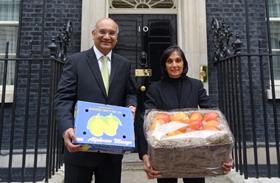
Indian exporters hoping to sell more of their fruit to the UK could benefit from a new trade deal negotiated in the wake of Brexit, according to observers.
UK Prime Minister Theresa May is leading a business delegation on a three-day visit to India this week, with some commentators suggesting that she will face calls to remove tariffs and cut red tape on Indian fresh produce exports to the UK, including mangoes, as part of any future agreement.
Writing exclusively for the international thinktank Gateway House: Indian Council on Global Relations, independent economist Yasmeen Khwaja said non-tariff barriers, including phytosanitary measures, were the real cause for concern among Indian fruit suppliers.
“The EU imposes rigorous labelling requirements and trademark norms which have adversely affected India’s EU exports, like those of Alphonso mangoes,” she explained.
As part of the EU, the UK was obliged to ban imports of Indian mangoes in 2014 following concerns over a possible risk of fruit fly contamination.
Indian Prime Minister Narendra Modi is clearly keen to make agriculture a prominent part of the country’s development in the next few years, having this year set a target to double farmer incomes by 2022.
Writing in a separate article for Gateway House, Khwaja said that, more generally, government plans to develop investment in irrigation, raise agricultural funding and establish a dedicated levy to support agricultural improvement in India were likely to lead to significant improvement and put Indian agriculture “firmly on the global map”.
“India’s agriculture has the potential to be a big hitter,” she wrote. “India is the world’s second largest producer of fruits and vegetables yet only ranks tenth among exporting countries. This year’s budget can set the ball rolling and herald in a new era for Indian agriculture.”



